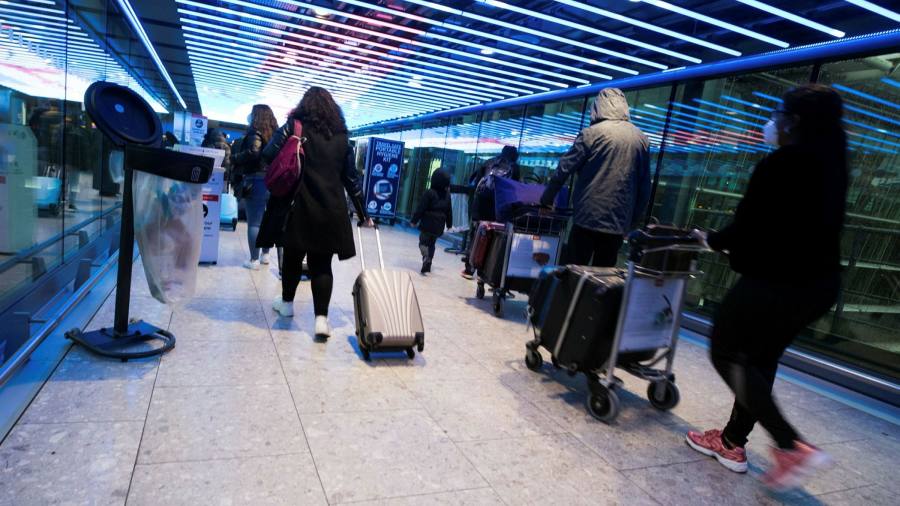[ad_1]
Boris Johnson is set to authorise a cut in the levy paid by airlines for domestic flights to help revive the beleaguered industry in the wake of the Covid-19 pandemic.
The prime minister will announce a review of air passenger duty with a view to halving the current level, according to senior Whitehall figures.
The recommendation will form part of a wider Union Connectivity Review by Sir Peter Hendy, the chairman of Network Rail, to be published on Wednesday, proposing a new “UK Strategic Transport Network†to oversee British transport priorities.
The UK previously belonged to the Trans-European Transport Network as an EU member, paying €488m a year towards the body created to better connect the bloc’s patchwork of infrastructure, including roads, railways and airports.

The government will meanwhile make £20m available as development funding for new projects including upgrades to the North Wales Coast rail line and the A75 motorway in Scotland and a train link between the West Coast Mainline and the proposed High Speed 2 route.
The Hendy report devotes just two sentences to Johnson’s idea of a new bridge or tunnel between Scotland and Ireland, which is seen by Treasury officials as an impractical pipe dream.
It says that the government has appointed former HS2 co-chairman Doug Oakervee to lead a technical review of such schemes, alongside Gordon Masterton, former president of the Institution of Civil Engineers.Â
The plan to cut APD will be put to a consultation, meaning that it is unlikely to be introduced until next year.
The levy, which raised £3.7bn in 2019, is paid by every traveller flying from UK airports and alters according to distance travelled and cabin class.
Hendy will propose two alternatives: either a “return leg exemption†so that travellers only pay for their outward flight, or a halving of the current levy of £13 per domestic flight. The changes would not apply to short-haul travel outside the UK.
The proposal was welcomed by the airline industry, which has long argued that APD stifles demand for flying, particularly on domestic routes where passengers pay on both legs of a return journey. Many European countries have no equivalent tax, or charge a lower rate.
“This is really positive news that will help support regional connectivity, level up the UK, and provide a welcome measure of relief to domestic carriers facing an existential threat from the impacts of Covid. It will help to sustain current domestic connections,†said Tim Alderslade, the chief executive of lobby group AirlinesUK.Â
Domestic air connectivity suffered a major blow last year with the collapse of Flybe, then Europe’s largest regional airline, with a monopoly on many UK routes.
Several regional airports have temporarily closed during the pandemic, and last week the Welsh government pumped more than £40m into Cardiff airport to keep it running.
Critics say the air duty cut — coming just days after fuel duty was frozen for the 10th consecutive year — further undermines ministers’ commitment to a target of net-zero carbon by 2050.
Doug Parr, chief scientist for Greenpeace UK, said: “After the fuel duty freeze and rail fare rises, cutting duty on domestic flights would continue our nonsensical trend of the higher the carbon, the lower the tax.â€
But ministers argue that domestic flights only account for 3.8 per cent of UK aviation emissions. They also want to impose new responsibilities for offsetting on airlines in future international agreements, according to Whitehall sources.
UK support for its domestic air industry contrasts with the stance taken by some other European countries.
France tied support for Air France with a push to stop competition with long-distance train travel, while Germany’s Lufthansa this week unveiled a partnership with state railway Deutsche Bahn, which aims to encourage people to use the train rather than plane on shorter journeys.
[ad_2]
Source link





